翻译培训 名词性从句的译法
名词性从句的翻译
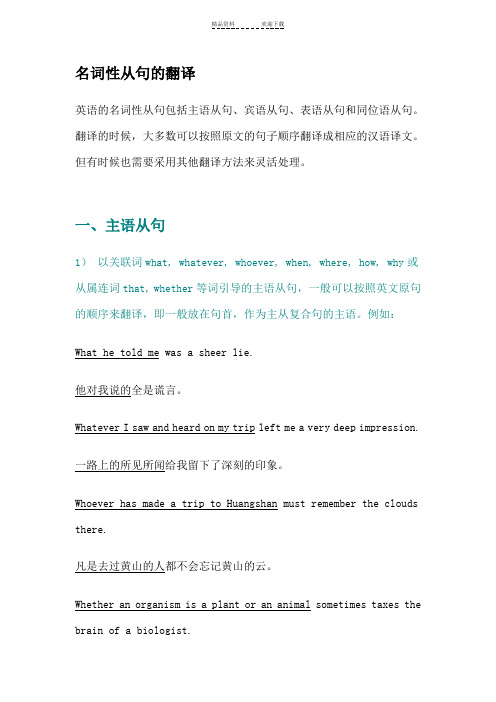
名词性从句的翻译英语的名词性从句包括主语从句、宾语从句、表语从句和同位语从句。
翻译的时候,大多数可以按照原文的句子顺序翻译成相应的汉语译文。
但有时候也需要采用其他翻译方法来灵活处理。
一、主语从句1)以关联词what, whatever, whoever, when, where, how, why或从属连词that, whether等词引导的主语从句,一般可以按照英文原句的顺序来翻译,即一般放在句首,作为主从复合句的主语。
例如:What he told me was a sheer lie.他对我说的全是谎言。
Whatever I saw and heard on my trip left me a very deep impression.一路上的所见所闻给我留下了深刻的印象。
Whoever has made a trip to Huangshan must remember the clouds there.凡是去过黄山的人都不会忘记黄山的云。
Whether an organism is a plant or an animal sometimes taxes the brain of a biologist.一种生物究竟是植物还是动物,有时会让生物学家颇伤脑筋。
2) 对于it作形式主语的主语从句,可以先译主句,顺译为无人称句。
有时也可先译从句,再译主句,这样的话,一般需要在主句前加译“这”。
需要注意的是,如果强调it,可以将其译出;如果不需要强调,也可不译。
例如:It is strange that she should have failed to see her own shortcomings.真奇怪,她竟然看不出自己的缺点。
It seemed incredible that she should have lied to us.她居然对我们说谎,这真是不可思议。
It doesn’t make much difference to me whether you come or not.你来不来我不在乎。
名词性从句的译法7

It +谓语+that从句
问题是他是否已在合同上签了字。
The trouble is that they are short of money. 麻烦的是他们缺钱。
同位语从句的译法
将同位语从句翻译成宾语。 将同位语从句翻译成定语。 将同位语从句翻译成同位语。
将同位语从句翻译成宾语
There are clear indications that the war will soon be over.
A. 他竟然没有看出自己的缺点,这很奇怪。。
B. 真奇怪,他竟然没有看出自己的缺点。
It is +名词+that从句
翻译这类结构时,通常会涉及到“词类转 换”和“语序调整”等翻译技巧。
常用于这种结构的名词词组有:a fact, a pleasure, a pity, a pleasant thing, one’s duty, an honor, a shame, no easy job, good news, a waste of time等
科学家获得了令人振奋的发现,即可以把 这种废料制成塑料。
The answer lies in the fact that the girl practices the piano every evening. 答案在于这样的事实,即这个女孩每天晚 上都练习钢琴。
翻译练习I
How you manage on your small income is puzzle to me.
英语从句的翻译
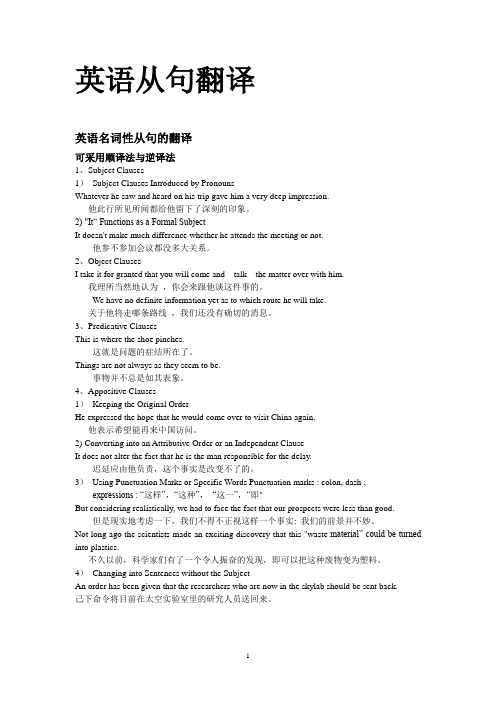
英语从句翻译英语名词性从句的翻译可采用顺译法与逆译法1、Subject Clauses1)Subject Clauses Introduced by PronounsWhatever he saw and heard on his trip gave him a very deep impression.他此行所见所闻都给他留下了深刻的印象。
2) "It“ Functions as a Formal SubjectIt doesn't make much difference whether he attends the meeting or not.他参不参加会议都没多大关系。
2、Object ClausesI take it for granted that you will come and talk the matter over with him.我理所当然地认为,你会来跟他谈这件事的。
We have no definite information yet as to which route he will take.关于他将走哪条路线,我们还没有确切的消息。
3、Predicative ClausesThis is where the shoe pinches.这就是问题的症结所在了。
Things are not always as they seem to be.事物并不总是如其表象。
4、Appositive Clauses1)Keeping the Original OrderHe expressed the hope that he would come over to visit China again.他表示希望能再来中国访问。
2) Converting into an Attributive Order or an Independent ClauseIt does not alter the fact that he is the man responsible for the delay.迟延应由他负责,这个事实是改变不了的。
三、英译汉基础翻译要点——名词从句的译法

B.以形式主语it引出的主语从句, 翻译时有三种处理办法:
❖1. 如主语从句较短,可提前与主 句合译为“是”字结构。如:
❖例1. It is dangerous that you have a smattering of superficial knowledge on a subject. 对任何问 题一知半解都是危险的。
B.同位语从句提前,如:
❖例1.Do away with the mistake metaphysical notions that “gold must be pure” and that “man must be perfect”.
❖ 要打破“金要足赤”,“人要完 人”的形而上学的错误思想。
❖ 例2.Obviously there was little probability that they would succeed, but they don’t mind. 很显然,他们成功的可能性很小,但 是他们不在乎。
❖ 物体在水中比在空气中轻,这是一种大家 共有的经验。
❖ 例2.It is common sense that a liquid has no definite shape, but it has a definite volume.
❖ 液体没有一定的形状,但有一定的体积, 这是普通常识。
❖ 例4.It therefore becomes more and more important that, if students are not to waste their opportunities, there will have to be much more detailed information about courses and more advice.
6 名词性从句的译法

主语从句译法 What
the students find most difficult
in English is its idiomatic usage.
学生感到,
英语最困难的地方是
它的习惯用法。
主语从句译法 Whether
he comes or not makes no
difference.
through the crisis of his illness. 我担心他是否能渡过疾病的危险期。
Smith
replied that he was sorry.
史密斯回答说,他感到遗憾。
宾语从句翻译 用 it 作形式宾语的句子,汉译时
that引起的宾语从句一般可按照原 文顺序,it不译。 I take it for granted that you will come and talk the matter over with him. 我想你会来跟他谈这件事的。
whtever;whoever;whichever;
when; where; how; why;
宾语从句翻译 宾语从句翻译顺序可顺可逆,比较
灵活,具体视情况确定。
Can
you hear what I say?
你听得到我所讲的吗?
宾语从句翻译 I
worry about whether he can pass
主语从句译法
It is quite obvious that the girl still loves you deeply. It is an honor that I was invited to attend your marry ceremony.
很明显,这个女孩依然深爱着你。
名词性从句的译法
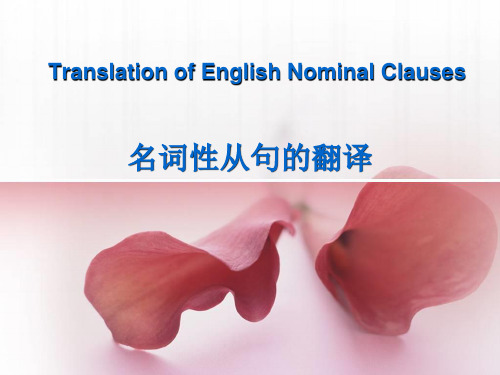
例4:Whatever he saw and heard on his trip gave him a very deep impression. 【译文】他此行所见所闻都给他留下了深刻的印象。 例5:Since hearing her predicament, I’ve always arranged to meet people where they or I can be reached in case of delay. 【译文】听她说了那次尴尬的经历之后,每每与人约 见,我总要安排在彼此能够互相联系的上的地 方,以免误约。
从句)
【译文】物质是由粒子组成的,这些粒子在一些物 态中要比在另一些物态中更易于运动。 根据上 述理论,我们可以简要地阐明固体、液体和气 体之间的主要差别。
补充例句:名词性从句 例7.It is flattering to believe that they (ideas) are too profound to be expressed so clearly that all who run may read, and very naturally it does not occur to such writers that the fault is with their own minds which have not the faculty of precise reflection. 【译文】认为自己的思想深奥,不可能表达得很清 楚,让任何人都能理解,这是一种虚荣的念头。 这样的作家当然不会想到,问题还是出在自己 脑子缺乏精确思考的能力。来自2 名词性从句译成定语从句
翻译技巧 8 名词性从句的翻译
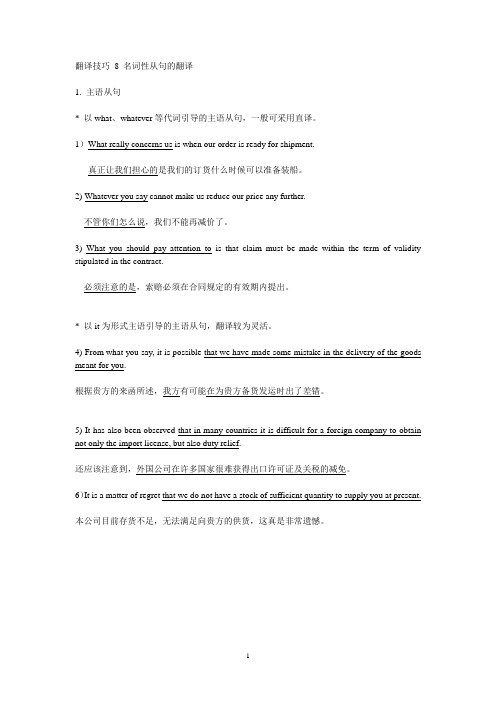
翻译技巧8 名词性从句的翻译1. 主语从句* 以what、whatever等代词引导的主语从句,一般可采用直译。
1)What really concerns us is when our order is ready for shipment.真正让我们担心的是我们的订货什么时候可以准备装船。
2) Whatever you say cannot make us reduce our price any further.不管你们怎么说,我们不能再减价了。
3) What you should pay attention to is that claim must be made within the term of validity stipulated in the contract.必须注意的是,索赔必须在合同规定的有效期内提出。
* 以it为形式主语引导的主语从句,翻译较为灵活。
4) From what you say, it is possible that we have made some mistake in the delivery of the goods meant for you.根据贵方的来函所述,我方有可能在为贵方备货发运时出了差错。
5) It has also been observed that in many countries it is difficult for a foreign company to obtain not only the import license, but also duty relief.还应该注意到,外国公司在许多国家很难获得出口许可证及关税的减免。
6)It is a matter of regret that we do not have a stock of sufficient quantity to supply you at present.本公司目前存货不足,无法满足向贵方的供货,这真是非常遗憾。
翻译培训3名词性从句的译法课件
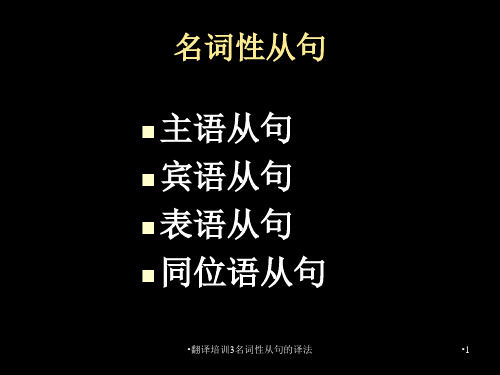
The answer lies in the fact that the girl practices the piano every evening.
答案在于这样的事实,即这个女孩每天晚
上都练习钢琴。•翻译培训3名词性从句的译法
•25
翻译练习
•翻译培训3名词性从句的译法
•26
How you manage on your small income is puzzle to me.
•翻译培训3名词性从句的译法
•12
It +谓语+that从句
通常按原文句子结构顺序翻译,It 不 译出来。
•翻译培训3名词性从句的译法
•13
例:
It seems that she is going to buy a car on installment.
她好像要用分期付款的方式购买汽车。
It goes without saying that plants cannot grow without sunlight.
•2
例:
That the living conditions are improving is evident.
生活条件在改善,这很明显。
That the pilot could have survived the crash seemed inconceivable.
驾驶员在飞机坠毁之后,竟然还能活着, 这看来是不可想象的事。
人们普遍认为,疾病应当以预防为主。
It is frequently said that computers solve problems only because they are “programmed” to do so..
名词性从句的译法

目 录
• 名词性从句的概述 • 名词性从句的翻译技巧 • 名词性从句在句子中的位置和功能 • 名词性从句的特殊译法 • 名词性从句在汉译英中的应用
01
名词性从句的概述
定义与分类
定义
名词性从句是句子在复合句中充当名 词成分,包括主语、宾语、表语和同 位语等。
分类
根据功能和意义,名词性从句可以分 为陈述性从句、疑问性从句和祈使性 从句。
主语从句
主语从句在句子中充当主语,表达句子 的核心信息。
在翻译时,通常将主语从句放在句首,以突 出其重要性。
例如:When he comes back is unknown. 他什么时候回来还不知 道。(主语从句翻译为“什么时候 他回来还不知道”)
宾语从句
01
宾语从句在句子中充当宾语,对句子的主语进行补 充说明。
详细描述
合句法是指将多个简单句合并成一个长句,使译文更加 紧凑、连贯。这种方法通常用于翻译多个简单句构成的 长句,如“She is beautiful, and that is why he likes her.”可合句译为“她很漂亮,这就是他喜欢她的原因。 ”
03
名词性从句在句子中的 位置和功能
要点二
详细描述
分句法是指将复杂的名词性从句拆分成多个简单句,使译 文更加清晰、易于理解。这种方法通常用于翻译包含多个 从句或修饰语的名词性从句,如“What I like is the way she talks.”可分句译为“我喜欢的是她说话的方式。”
合句法
总结词
将多个简单句合并成一个长句,增强整体感。
在翻译过程中,要保持原文的语义完整性和通顺度,避免出现歧义和语病。同时,要注意符合目标语 言的表达习惯和规范。
4种名词性从句的翻译方法

• In July 1898, Curie and her husband got a great success that they discovered the radioactive element—polonium.
• 你来不来我不在乎。
• It seemed incredible that she should have lied to us. • 她居然对我们说谎,这真是不可思议。
• It is strange that she should have failed to see her own shortcomings.
works.【主谓结构作定语】
这是关于这台新型电气仪表如何运作的说明。
2024/8/8
12
同位语从句
常用连词that或链接副词来 引导,用以对某个名词作进 一步的解释或说明。翻译时 也可采取不同的方法。
2024/8/8
13
• 方法一:把同位语从句译成汉语联合复句中的一个分句。
• It was from these slender indications of scholarship that Dr. Weldon drew the conclusion that I was worthy to pass into Harrow.
绕着人工湖跑步的一个好处,就是不能抄近路回家。
The fact is that electronic computer are of great benefit to the development of science and technology.【主谓结构】 事实是电子计算机十分有利于科学技术的发展。
名词性从句的译法

It’s a pity that you missed such a fine talk.
真遗憾,这样好的报告你没听到。
It is a sheer waste of time that we read such kink of trash.
阅读这样的垃圾图书简直就是浪费时间。
It +被动语态+that从句
名词性从句的译法
名词性从句
主语从句 宾语从句 表语从句 同位语从句
主语从句的译法
“that + 从句的主语+从句的谓语+主句 的谓语” 译法:可以将“that从句”单独译成一 句,加逗号,再使用“这”字作主语 的句子。 “that”在句中只起连接作用,可省去 不翻。
例:
That the living conditions are improving is evident. 生活条件在改善,这很明显。 That the pilot could have survived the crash seemed inconceivable.
例:
It is an accepte fact that the climate around the world is changing.
世界各地的气候都在变化,这是人所共知 的事实。
相当于: That the climate around the world is changing is an accepted fact.
It is my suggestion that everybody should be there by seven o’clock. 我建议所有的人必须七点钟到达那里。
名词性从句的翻译技巧
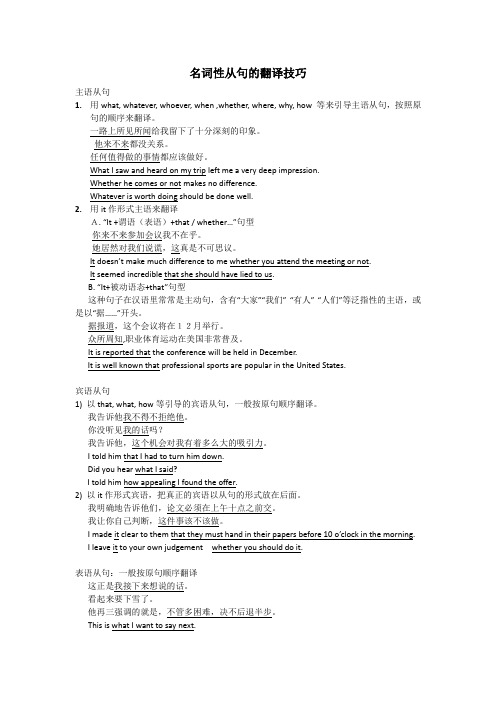
名词性从句的翻译技巧主语从句1.用what, whatever, whoever, when ,whether, where, why, how 等来引导主语从句,按照原句的顺序来翻译。
一路上所见所闻给我留下了十分深刻的印象。
他来不来都没关系。
任何值得做的事情都应该做好。
What I saw and heard on my trip left me a very deep impression.Whether he comes or not makes no difference.Whatever is worth doing should be done well.2.用it作形式主语来翻译A. “It +谓语(表语)+that / whether…”句型你来不来参加会议我不在乎。
她居然对我们说谎,这真是不可思议。
It doesn’t make much difference to me whether you attend the meeting or not.It seemed incredible that she should have lied to us.B. “It+被动语态+that”句型这种句子在汉语里常常是主动句,含有“大家”“我们”“有人”“人们”等泛指性的主语,或是以“据……”开头。
据报道,这个会议将在12月举行。
众所周知,职业体育运动在美国非常普及。
It is reported that the conference will be held in December.It is well known that professional sports are popular in the United States.宾语从句1) 以that, what, how等引导的宾语从句,一般按原句顺序翻译。
我告诉他我不得不拒绝他。
你没听见我的话吗?我告诉他,这个机会对我有着多么大的吸引力。
英译汉——名词性从句的译法

考研英语每日一课(英译汉——名词性从句的译法)英译汉——名词性从句的译法英语名词性从句包括主语从句,宾语从句, 表语从句和同位语从句, 在翻译这类从句时, 大多数可以按照原文的句序翻译成相应的汉语,但是也有一些具体的处理方法,下面我们结合一些实例加以说明:例1.How andwhenhuman lang uagedevel opedand w hethe r ani malssuchasch impan zeesand g orill as ca n dev elopa mor e ela borat e sys tem o f com munic ation areissue s atprese nt be ing r esear ched, butas ye t lit tle u nders tood.人类的语言是如何发展起来的, 是什么时候形成的, 诸如黑猩猩和大猩猩一类的动物是否会形成一种更加复杂的交流系统,都是现阶段人们研究的课题, 但对此人们都知之甚少。
(主语从句)例2.How w ell t he pr edict ion w ill b e val idate d bylater perf orman ce de pends upon theamoun t, re liabi lity, andappro priat eness of t he in forma tionusedand o n the skil l andwisd om wi th wh ich i t isinter prete d. (95年考题)这些预测能在多大程度上被后来的成绩所证实取决于所使用的信息的量、可靠性和适合程度,并取决于对信息作出解释的技能和智慧。
- 1、下载文档前请自行甄别文档内容的完整性,平台不提供额外的编辑、内容补充、找答案等附加服务。
- 2、"仅部分预览"的文档,不可在线预览部分如存在完整性等问题,可反馈申请退款(可完整预览的文档不适用该条件!)。
- 3、如文档侵犯您的权益,请联系客服反馈,我们会尽快为您处理(人工客服工作时间:9:00-18:30)。
宾语从句的译法
在把宾语从句译成汉语时,通常按 照句子的语序翻译即可。
有时也视具体情况对原文语序进行 调整。
例:
They proposed that we take certain precautions.
It +谓语+that从句
通常按原文句子结构顺序翻译,It 不 译出来。
例:
It seems that she is going to buy a car on installment.
她好像要用分期付款的方式购买汽车。
It goes without saying that plants cannot grow without sunlight. 不言而喻,没有阳光,植物就不能生长。
Enthusiasm means that your are stimaulated by your work, and are able to find new challenges and keep growing professionally. But most jobs have some elements that are less fun and more difficult to carry out. This is where passion really comes into play. When you love that you do, it isn’t too difficult to get the job done. The hard part is performing equally well in those less interesting tasks.
We’ll discuss the problem whether the sports meeting will be held on time.
我们将讨论运动会能否按时开的问题。
It is common sense that the whale is not a fish.
鲸鱼不是鱼,这是普通常识。
人们普遍认为,疾病应当以预防为主。
It is frequently said that computers solve problems only because they are “programmed” to do so.. 人们常说,电脑之所以能解决问题,只是 因为它们给输入了解决问题的“程序”。
A. 他竟然没有看出自己的缺点,这很奇怪。。
B. 真奇怪,他竟然没有看出自己的缺点。
It is +名词+that从句
翻译这类结构时,通常会涉及到“词类转 换”和“语序调整”等翻译技巧。
常用于这种结构的名词词组有:a fact, a pleasure, a pity, a pleasant thing, one’s duty, an honor, a shame, no easy job, good news, a waste of time等
问题是他是否已在合同上签了字。
The trouble is that they are short of money. 麻烦的是他们缺钱。
同位语从句的译法
将同位语从句翻译成宾语。 将同位语从句翻译成定语。 将同位语从句翻译成同位语。
将同位语从句翻译成宾语
There are clear indications that the war will soon be over.
我方想知道贵方能否及时交货。
With so many companies cutting back on their work force lately, do you know how an employee can hold onto his current job? 鉴于最近如此众多的公司在裁员,您知道 作为一个雇员如何才能保住自己目前的工 作吗?
should use the software.
老教授给我们提出了一些如何使用这个软 件的建议。
We must face the fact that we might lose our deposit. 我们必须正视我们可能会失去存款的事实。
将同位语从句翻译成同位语
The scientists made an exciting discovery that this waste material could be turned into plastics.
It’s a pity that you missed such a fine talk.
真遗憾,这样好的报告你没听到。
It is a sheer waste of time that we read such kink of trash.
阅读这样的垃圾图书简直就是浪费时间。
It +被动语态+that从句
我希望贵方对第一批货会感到非常满意。
It is impolite not to return telephone calls --regardless of whom they are from. 不管电话是谁打的,不回电话是不礼貌的。
We appreciate your cooperation and trust that our products will turn out to your satisfaction. 谢谢贵方的合作,相信我方的产品会让贵 方满意的。
如果贵方对我方的提议感兴趣,我方想知 道贵方的签约条件。
I know nothing about the matter except what you told. 除了你告诉我的情况以外,我对此事一无 所知。
表语从句的译法
在把表语从句译成汉语时,通常按 照句子的语序翻译即可。
The question is whether he has signed the contract.
例:
It is an accepte fact that the climate around the world is changing.
世界各地的气候都在变化,这是人所共知 的事实。
相当于: That the climate around the world is changing is an accepted fact.
我一直纳闷你是如何靠那点收入过日子的。
The fact is that funding for international environmental cooperation has been drying up even as environmental issues are at the top of the globl agenda. 事实是,虽然环境问题位居全球的首要问 题,国际环境合作的资金却在不断萎缩。
驾驶员在飞机坠毁之后,竟然还能活着, 这看来是不可想象的事。
“It is + 形容词+that 从句”
译法:先将“that从句”单独翻译出来, 然后加上“(这是)很+形容词”的结 构。
有时将形容词转译成副词短语,会使 译文更符合汉语的表达习惯。
例:
It’s probable that we will be a little late.
有明显的迹象表明战争即将结束。
We express the hope that they would come and visit China again. 我们希望他们再来中国访问。
将同位语从句翻译成定语
The old professor gave us some advice how we
For a moment, I even thought that this was some sort of test , and that this woman was someone from the head office, testing my loyalty. 曾有一刻,我甚至认为这是一种考验,这 位女士是从总公司来的,来检验我的忠诚 的。
这类句型常译成主动句,并增加泛指 的“大家”、“我们”、“人们”等 作主语。
通常对这种结构的译法是保留原文句 子结构的前后顺序,先译主句,再译 从句。
例:
It is generally regarded that stress should be put on the prevention of disease.
It is my suggestion that everybody should be there by seven o’clock. 我建议所有的人必须七点钟到达那里。
The manager made a suggestion that the meeting should be put off till Friday.
他们建议我们采取一定的预防措施。
Let’s see how we can raise our efficiency.
咱们看看怎样才能提高效率。
If you are interested in our proposal, we should be glad to know on what terms you would be willing to conclude an agreement.
At that stage in my life, I really was not certain where I would ultimately go in life and what I would do with the years ahead of me.
